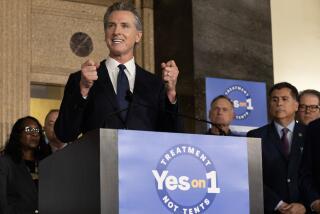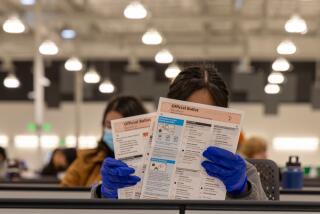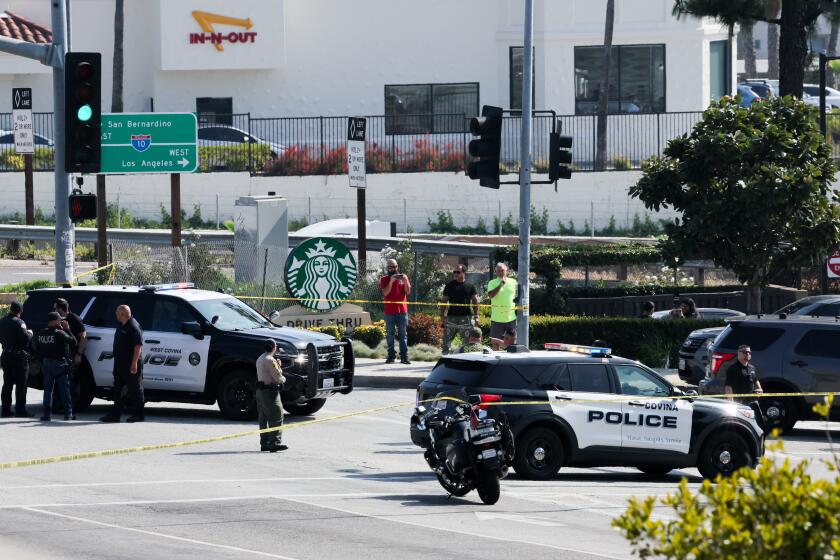Californians agree: State government doesn’t serve them
As metaphors go, last week served up a doozy. A married member of the Legislature resigned his office after blurting out over an open microphone salacious details about relationships with two women, at least one of them said to be a lobbyist.
The assemblyman later said he was not guilty of affairs but, rather, of “inappropriate story-telling.” If you believe his original words, then, he was in bed with a lobbyist. If you believe his recantation, he just wanted people to think he was in bed with a lobbyist.
You didn’t have to be outside the windows looking in to get the picture, and Californians do, according to a poll released last week by the Public Policy Institute of California. The poll showed that, overwhelmingly, Californians believe their state government is servicing the few -- say, those represented by lobbyists -- over the needs of the many.
Only 20% of Californians, and only 15% of regular voters, felt the government elected by the people and for the people had any interest in the people, broadly speaking. And the poll was taken before the scandal involving Republican Mike Duvall broke.
The only good news in the poll, if there was any, was its demonstration that we have finally become the unified, “post-partisan” state that Gov. Arnold Schwarzenegger has been advertising: Everyone distrusts government, or at least huge majorities of all political groups do.
On the question of whom state government serves, “a few big interests” was the answer of 75% of Democrats. And 78% of Republicans. And 74% of independents.
In their view, “something is terribly broken about state government -- it’s not responsive, it’s not effective and it’s not efficient,” said PPIC President Mark Baldassare, a veteran California pollster.
It’s little wonder how Californians draw their conclusions. Even those who pay only scant attention to Sacramento can pick up a distasteful whiff. Capital calendars are chock-a-block with lavish meetings between wealthy donors -- or their operatives -- and legislators. Overseas junkets, professional sports games and other activities fill in gaps in the dance cards.
The current speaker, Democrat Karen Bass of Los Angeles, chummied up with lobbyists in Pebble Beach earlier this year. Her predecessor, Fabian Nuñez, also a Democrat from Los Angeles, spent tens of thousands of his campaign dollars on overseas travel, expensive wine and other high-end purchases.
That would be the same Fabian Nuñez who is now a partner in Mercury Public Affairs, the public relations firm that was due to receive a $9-million contract from a state commission 10 days ago, until an article in The Times disclosed the idea and derailed it.
The state high-speed rail commission is dominated by Schwarzenegger appointees; the recommendation for the contract came from a staff panel with close ties to Mercury’s partners, which include the governor’s top political advisor and his former campaign manager, as well as Nuñez. After a burst of publicity, the commission announced it will rethink the whole thing and issue a new recommendation in the fall.
None of that means Mercury itself did anything wrong, but it served to corroborate the belief of many Californians that their government inhabits a tight little world that excludes most of the state.
That sentiment is only exacerbated by the fearful recession, which has driven the demand that someone, somewhere, stop the destructive spiral of job losses, home losses and dislocation. When people see no improvement in their own circumstances, Baldassare said, they presume that the in-crowd must be benefiting instead.
“Increasingly,” Baldassare said, “they are seeing things slipping away in California. This is a state that was great, not a state that is great. That is very depressing to the average Californian.”
At least part of the depression stems from the notion that California has tried almost everything to stem its fall, including throwing a Hail Mary pass in 2003 by selecting a previously unelected movie star to run the state, on his promise that things would be better.
Now the governor, whose landslide election drew the highest voter turnout in a governor’s race in two decades, is mired with the highest disapproval rate of his tenure, 61%.
This has always been a tortuously difficult state to govern, too big and diverse to come to peaceful agreement most of the time. But part of the problem has also been a California notion that to all problems there must be an easy solution, if only we could find it.
A depressed and distrustful California would not seem inclined to eradicate that flaw. Yet Dan Schnur, director of the Jesse M. Unruh Institute of Politics at USC and a former Republican strategist, said he caught glimmers in the poll of a populace that might now be more ready to accept difficult realities.
“Voters are learning that there is no magic, snap-your-fingers solution,” he said. “They’ve been told any number of times that things are going to make the state magically work better, and they just don’t believe in magic anymore.”
Each Sunday, The Week examines implications of major stories. It is archived at latimes.com/theweek.
More to Read
Start your day right
Sign up for Essential California for news, features and recommendations from the L.A. Times and beyond in your inbox six days a week.
You may occasionally receive promotional content from the Los Angeles Times.







